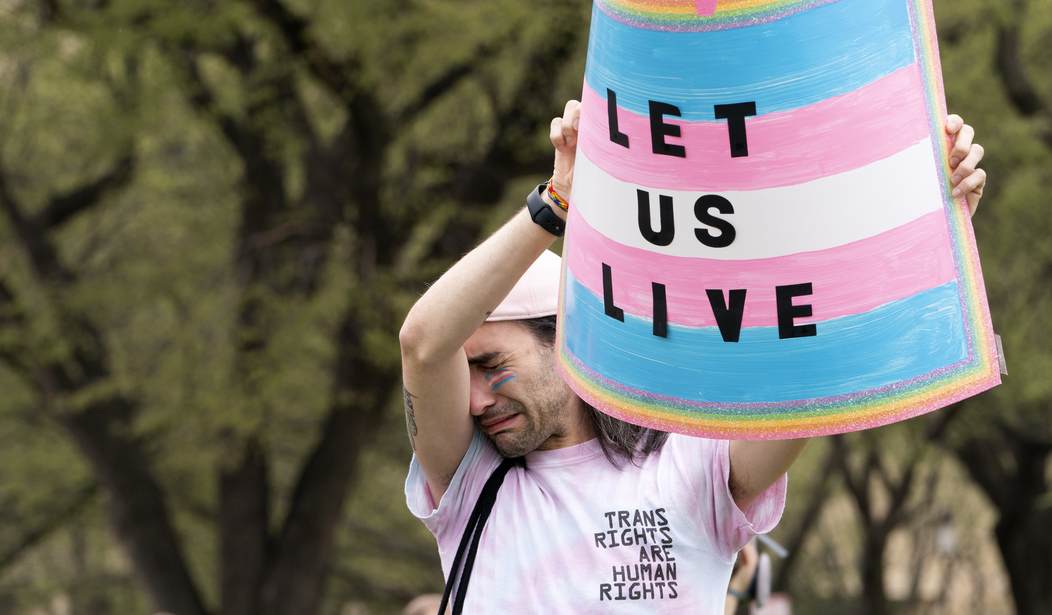A groundbreaking article in the New York Times by Pamela Paul on transitioning kids to another gender is already being attacked by the radical left and transgender activists for not conforming to the narrative.
"As Kids, They Thought They Were Trans. They No Longer Do" goes into excruciating details about the out-and-out quackery of some doctors who support transitioning pre-teens and teens. The piece details the heartbreaking tragedy of some girls whose surgeries and hormone treatments will now prevent them from having their own children after they changed their minds about their gender.
It should be noted that this is an opinion piece. It is not the New York Times doing an about-face and coming out against transitioning children. They are likely to publish a pro-transitioning piece very soon as a rebuttal.
But for the Times to give any space at all to the opposing viewpoint is actually a courageous thing for them to do. Hysterical trans activists will brook no opposition to their ideology so credit goes where credit is due.
Essentially, the biggest problem is the lack of open debate on transitioning children and teens. And that problem is caused by the transgender lobby, which has made it a point to destroy the careers of any mental health professional who questions the dominant narrative that kids should be transitioned based on nothing more than their own confused feelings about gender.
Laura Edwards-Leeper is the founding psychologist of the first pediatric gender clinic in the United States. She began her practice by treating adults exclusively and has only recently seen a huge upswing in mostly teenage girls wanting to change their genders. She is very concerned about the lack of professional standards. "As far as I can tell, there are no professional organizations who are stepping in to regulate what’s going on.”
These gender transition clinics are popping up all over the world. They aren't there to treat anyone. They exist to transition kids. Well-meaning or not, it's incredibly unprofessional.
Leeper has a particular issue with the new diagnosis of "rapid onset gender dysphoria" which is a catch-all that allows quacks to give kids hormones and encourages them to dress and act the gender they think they are.
Most of her patients now, she said, have no history of childhood gender dysphoria. Others refer to this phenomenon, with some controversy, as rapid onset gender dysphoria, in which adolescents, particularly tween and teenage girls, express gender dysphoria despite never having done so when they were younger. Frequently, they have mental health issues unrelated to gender. While professional associations say there is a lack of quality research on rapid onset gender dysphoria, several researchers have documented the phenomenon, and many health care providers have seen evidence of it in their practices.
"Do you want a dead son or a live daughter?" is the way these quacks scare parents into agreeing to the transition treatments. Parents are led to believe that unless their child undergoes hormone treatments and is seen by the parents as the gender the child has chosen, they will commit suicide.
As Leeper points out, other mental health issues that manifest themselves in depression, isolation, cutting, and other self-harm behaviors may be the real cause of gender dysphoria, and studies showing little or no benefit from hormones or other transitioning treatments call into question the entire transition process for children.
The idea that hormone treatments can save a kid's life is just more quackery.
Parents are routinely warned that to pursue any path outside of agreeing with a child’s self-declared gender identity is to put a gender dysphoric youth at risk for suicide, which feels to many people like emotional blackmail. Proponents of the gender-affirming model have cited studies showing an association between that standard of care and a lower risk of suicide. But those studies were found to have methodological flaws or have been deemed not entirely conclusive. A survey of studies on the psychological effects of cross-sex hormones, published three years ago in The Journal of the Endocrine Society, the professional organization for hormone specialists, found it “could not draw any conclusions about death by suicide.” In a letter to The Wall Street Journal last year, 21 experts from nine countries said that survey was one reason they believed there was “no reliable evidence to suggest that hormonal transition is an effective suicide prevention measure.”
“I felt so detached from my body, and the way it was developing felt hostile to me,” Powell told Paul. It was classic gender dysphoria, a feeling of discomfort with your sex. She convinced her mother to send her to a clinic where, at age 17, she began hormone therapy. She had a double mastectomy before going to college.
"At no point during her medical or surgical transition, Powell says, did anyone ask her about the reasons behind her gender dysphoria or her depression. At no point was she asked about her sexual orientation. And at no point was she asked about any previous trauma, and so neither the therapists nor the doctors ever learned that she’d been sexually abused as a child," Paul writes.
"Follow the science" doesn't seem to be the operative procedure in the case of confused teens and worried parents being snookered by doctors and psychologists into potentially doing great damage to their physical and mental health.










